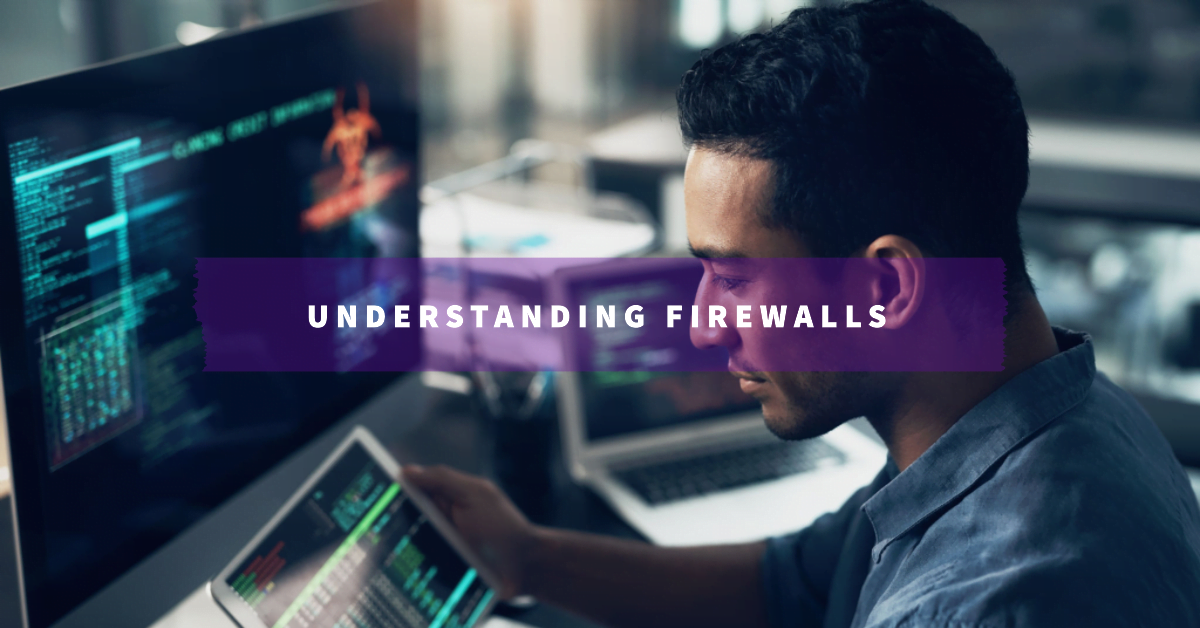
The First Line of Defense for Your Business
A Comprehensive Guide to Firewalls and Their Role in IT Security
Protecting your digital assets should be a top priority for any business, especially in today’s cyber-threat landscape. A fundamental part of that protection is a properly configured and managed firewall.
Firewalls are network security devices that monitor incoming and outgoing network traffic. They act as a barrier between secured internal networks and potentially untrusted external networks, like the Internet. Firewalls can be software-based or hardware-based, and they play a vital role in a multi-layered security architecture.
Just as a physical firewall prevents fire from spreading from one area to another, a network firewall prevents harmful cyber threats from spreading into your system and causing havoc. This metaphor helps in understanding the job of a firewall in your network security.
The Role of Firewalls in Network Security
Firewalls serve as the first line of defence in network security infrastructure. They use predefined rules to allow or block traffic to protect your private network and its data from potential threats.
Firewalls are used to protect both home and corporate networks, but a firewall’s demands for a large, complex network like a corporate one will be much greater than for a home-office user. There are also specialised firewalls for different situations, such as managed firewalls for businesses, home-offices, and schools.
Whether your business is big or small, or you’re working from a home office, it’s important to understand that no single device or security measure will fully protect you from intrusion. Security must be multi-layered, using a variety of defensive measures to ensure that all potential threats are addressed.
Firewalls form part of these measures, working in harmony with other solutions like data protection and encryption, endpoint security, secure web browsing practices, and security training for employees, to provide a comprehensive security solution for your business or home office. Kwik Support provides comprehensive IT security solutions to help ensure your digital assets are well protected.
Types of Firewalls and How They Function
The next crucial aspect to understand when discussing firewalls is the different types available and how they function. Firewalls can be broadly categorised into network firewalls and host-based firewalls, and they come in different types, including Packet-Filtering Firewalls, Stateful Inspection Firewalls, Proxy Firewalls, and Next-Generation Firewalls. Let’s explore these in detail:
1. Packet-Filtering Firewalls
The most traditional and oldest type of firewall, packet-filtering firewalls, work at the network level of the TCP/IP stack, also known as the OSI model’s network layer. They examine packets in isolation and do not know the packet’s context. These firewalls filter packets based on source and destination addresses, ports, and protocols. The limitation with this type of firewall is that it doesn’t understand the larger context of traffic.
2. Stateful Inspection Firewalls
These firewalls, also known as dynamic packet filtering firewalls, keep track of active connections and use the state information to determine which network packets to allow through the firewall. This provides more security than packet-filtering firewalls, but they can be slower and consume more resources.
3. Proxy Firewalls
Proxy firewalls operate at the OSI model’s application layer and act as intermediaries between two communication endpoints. Each incoming or outgoing request must first go through the proxy firewall, effectively hiding the network’s real endpoints. Proxy firewalls also provide additional features such as caching and content filtering.
4. Next-Generation Firewalls (NGFWs)
Next-Generation Firewalls incorporate the features of the standard firewall with quality of service (QoS) functionalities to provide advanced capabilities. These can include intrusion prevention systems, application intelligence and control, and advanced threat detection.
Host-Based vs. Network Firewalls
While network firewalls filter traffic going in and out of a network, host-based firewalls are installed on individual servers and monitor inbound and outbound network traffic for that particular machine. Host-based firewalls, which are often a component of security suites, are a necessary complement to network-based firewalls, especially for machines that are exposed to the internet, such as web servers.
Understanding your business or home-office requirements and the various types of firewalls available will allow you to make an informed decision on the most appropriate firewall for your needs. It’s essential to have a balance between security and functionality, as too much of either could negatively impact your operations.
Firewalls, however, are just one aspect of a much broader approach needed to secure your digital environment. That’s where managed services like those provided by Kwik Support come in. We offer comprehensive IT support services, including cloud management services, IT security solutions, data protection, and more. In the next part of this series, we will look into how firewalls fit into a broader security framework.
Firewalls within a Broader Security Framework
Security threats are continually evolving, and having a firewall in place is merely the first line of defence. A comprehensive security strategy should encompass several layers of protection. Here’s how firewalls fit into this broader framework:
Layered Security Approach
A layered security approach implies having multiple security measures in place to protect your network and data. If one measure fails, others are in place to catch the threat. Firewalls constitute one of these layers, typically the first line of defence against external threats. Other layers can include intrusion prevention systems (IPS), antivirus software, secure web gateways, and more.
Intrusion Prevention Systems (IPS)
IPS is a critical security component that complements firewalls. While firewalls limit access to a network, an IPS examines and scans network traffic to detect and prevent vulnerability exploits, wherein malicious packets sneak into the network.
Endpoint Security
Endpoint security is another layer that ensures all devices connected to the network (endpoints) are secure. It is increasingly critical with the rise of remote work and the Internet of Things (IoT), as each connected device potentially opens a new entry point for threats.
Security Information and Event Management (SIEM)
SIEM products provide real-time analysis of security alerts generated by applications and network hardware. By integrating a SIEM system, organisations can establish comprehensive security visibility.
Employee Awareness and Training
Finally, humans are often the weakest link in cyber security. Regular training can ensure that employees are aware of the latest threats and know how to respond.
Managed IT security services, like those offered by Kwik Support, take care of all these aspects and more, providing a holistic approach to IT security.
Conclusion
Firewalls are as crucial as locking your doors at night. They offer necessary protection against a range of cyber threats. However, as we’ve explored, they are just one component of a comprehensive security strategy.
For an in-depth, tailored approach to your security needs, considering partnering with a managed service provider. At Kwik Support, we offer a broad spectrum of services from comprehensive IT support to managed IT security services designed to protect your business or home office from ever-evolving cyber threats.
